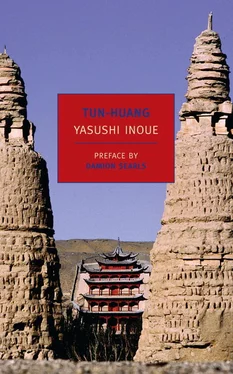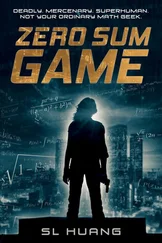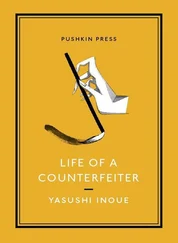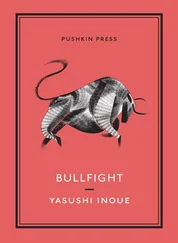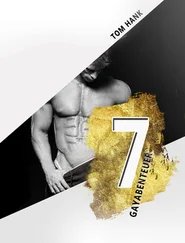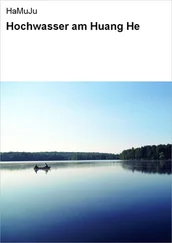Until the two armies drew quite near, everyone was silent. It was some time before the black specks, as minute as dust particles, grew larger and assumed the shapes of men and horses. As if involuntarily sucked together, the two bands gradually drew closer to each another.
Suddenly the battle drums thundered out. Hsing-te was blinded by clouds of dust stirred up by the horses as they galloped forward. He gave his horse free rein. War cries filled the air, and from time to time arrows and stones grazed him. No sooner had the vanguards met than they began to run through each other’s lines. Knowing only that they had closed in battle, the troops of both sides began to batter the formations of the other.
To his right and left, Hsing-te saw Uighur soldiers rushing toward him, one after another, in a continuous line like the flow of a mighty river. Almost all the Uighurs released their reins, hanging onto their mounts by gripping with their legs, and in this half-standing posture used both hands for their bows and arrows.
As before Hsing-se leaned forward on his horse and shot stones from his whirlwind cannon. Arrows continued to whiz past him, and angry cries, the pitiful whinnying of horses, and blankets of dust enveloped everything. In the midst of the hail of stones and arrows, men and horses collided, ran away, broke their legs, fell to the ground. Hsing-te dashed on determinedly, but still the scene of carnage seemed endless.
Suddenly he realized that his surroundings had brightened. He felt as though he had been thrown out from a terrifying, pitch black cavern into the bright sunlight. Instinctively he looked back. Wang-li was following directly behind with a murderous look on his face.
The unit had come through the battle lines and was pressing on. After a while the events of the distant battlefield appeared to Hsing-te like a brief episode in a daydream. The men formed into a large half circle away from the chaotic ground they had just left, where the two armies still battled on. When his horse ascended a hill, Hsing-te was astounded at what he saw. Far out in the distance the enemy band, which had also gone through the battle lines, was similarly forming a half circle, and was heading toward them. Once more the vanguards of the two bands approached each other as if pulled together by some magnetic force, and the distance between the two was quickly swallowed up.
The vanguards of the two bands clashed again. Shortly after, Hsing-te found himself in the center of the labyrinth. This time there was ferocious hand-to-hand combat. Swords glittered and battle cries echoed savagely. Once more two streams of men and horses, as if led by fate, ran through each other. Throwing away his whirlwind cannon, Hsing-te shouted something — unintelligible even to himself — swung his sword aloft, and raced forward into the endless stream of Uighurs.
Again Hsing-te was pushed out from the battlefield into a patch of quiet light. The sun shone; there was a hill; the dust billowed upward; and there were clouds in the azure sky. Lines of troops preceded and followed him. But the formation had been reduced, there was only a handful of scattered survivors. Hsing-te could only see a few familiar faces nearby. He tried to find Wang-li, but he could not see him anywhere. As he rode on, Hsing-te looked out toward the plains. There were two battlefields. And in the vast plain, lines of men and horses emerging from the combat crossed and recrossed like silk threads being pulled from a cocoon. The battlefield and lines of horsemen seemed to have a life of their own and did not remain still for a moment.
Hsing-te’s unit was again some distance from the battle itself and was forming a large arc. The survivors sought the enemy for a third time, but they were no longer in sight. After the second time, the Uighurs did not charge again.
Leaving behind the combat area and the two battlefields where death struggles were still going on, Hsing-te’s group began to race toward the west. At a safe distance from the battle, the men paused. As soon as his horse stopped, Hsing-te felt himself falling off. He saw the blue sky and the expanse of white sand from a strange angle. As he hung upside-down from his horse, a huge man with a blood-splattered face came into view. He spoke to Hsing-te from above.
“So you made it, too!” The voice had a familiar ring. It was Wang-li.
“And you, of all people, have also survived, I see,” Hsing-te said. Wang-li was silent.
“What a sight you are.” Wang-li pulled Hsing-te upright on his horse.
“I’m glad you made it,” Hsing-te said as he looked at his commander. To this Wang-li answered, “That’s what I should say. We’re going to form a suicide corps and invade Kan-chou. I’m going to join it. I’ll let you come, too.”
The company commander spoke gently. Hsing-te again slipped off his saddle. The war cries from the battlefield could still be heard, but they were now distant and faint.
Shortly after this, three thousand vanguard troops were selected from among the survivors and were told to proceed immediately to Kan-chou. Wang-li was promoted to commander of five hundred men, and Hsing-te was transferred to his unit.
When the men started forth, Hsing-te followed in a trance-like state, continually rocked by his horse, to which he was still tied. The troops rested briefly whenever the unit came across a spring or river. During each rest period, Wang-li brought water to Hsing-te.
That day the troops continued their march far into the night, and the order to encamp was given only after they had reached an oasis. Bathed in the silvery moonlight, orchards of pears and plums stretched out as far as one could see. When Hsing-te dismounted from his horse, he fell to the ground and slept as if dead. When he awoke in the morning, he found himself in an area of numerous irrigation ditches and cultivated fields. Beyond the fields was a hill, and he could see a city wall. It was Kan-chou.
In the clear, crisp air of early dawn, the troops rode to the approach of the city gate, at which point hundreds of men let loose a hail of arrows into the garrison. There was no response. After about half a minute, another hail of arrows was shot off. Again, there was no sign of resistance from within.
Wang-li came up to Hsing-te, who was sitting on the ground. The commander’s face was still covered with blood and looked as horrible as the day before, but it was impossible to tell whether it was his own blood or that of the enemy’s.
“A suicide platoon of fifty men will enter the city. I’ll take you along, too,” Wang-li said.
The fifty men selected crept toward the gate. They banded together with drawn swords and entered the city. Inside there was a pond full of clear water and two horses standing by its edge, but not a single human being was in sight. Nearby were a few houses enclosed within mud walls; each house was surrounded by trees with thick foliage.
The men continued further into the city. Each time they turned a corner, they cautiously spread out in single file. At Wang-li’s orders, Hsing-te was sent to the head of the group. The number of dwellings gradually increased, but still there was not a soul in sight. Only once did an arrow come flying out; it hit a mounted horse. Thus they knew that the city was not completely abandoned.
Whenever Hsing-te came to a fork in the road, he let his horse choose its own direction. The group turned many corners, entered many homes, and passed many wide streets. But they failed to find anyone.
On Wang-li’s orders, Hsing-te set off at a gallop. Behind him the fifty invaders charged recklessly through the large fortress. As they raced about two arrows came flying out again, but both fell limply on the ground. They had been shot from a good distance. It seemed that there should be more people to fight the enemy, but almost all the Kan-chou natives had run off, abandoning the land which they had held for many years.
Читать дальше
